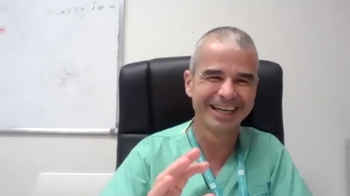
The director of the Sagol Center for Hyperbaric Medicine and Research at Yitzhak Shamir Medical Center discussed how hyperbaric oxygen therapy is being used to attempt to improve the damage from neurodegeneration.

The director of the Sagol Center for Hyperbaric Medicine and Research at Yitzhak Shamir Medical Center discussed how hyperbaric oxygen therapy is being used to attempt to improve the damage from neurodegeneration.

Could expanding insights into the pathophysiology of autoimmune epilepsy offer seizure-free hope for patients?

Howard Fillit, MD, founding executive director and chief science officer of the Alzheimer's Drug Discovery Foundation and clinical professor of geriatric medicine and palliative care, medicine, and neuroscience at Mount Sinai School of Medicine, detailed the role telemedicine plays in treating Alzheimer disease.

The first-in-class CH24H inhibitor was associated with a reduction in seizures and seizure frequency in an early analysis of the phase 2 ELEKTRA study, with plans to initiate the move to phase 3 in Dravet syndrome.

A group of international experts in the treatment of multiple sclerosis offer their varying viewpoints on the history, identification, and management of the disease.

Increased consumption of vegetables, nuts, and moderate alcohol intake are each inversely associated with the odds of 3 or more prodromal features that precede Parkinson disease.

The director of the Lou Ruvo Center for Brain Health and neurologist at Cleveland Clinic discussed how Alzheimer disease research may change if aducanumab becomes approved.

In part 2 of this interview, Hubert Fernandez, MD, director of the Center for Neurological Restoration at Cleveland Clinic, detailed the greatest unmet needs as well as the utility of deep brain stimulation in patients with Parkinson disease.

The vice president of science and medical at Dreem offered his opinion on how the company’s headband device can improve how sleep studies are conducted.

The authors noted that taken together, the findings suggest that either hearing impairment may affect brain atrophy and neuropathologic burden or that underlying pathologies may impair functional hearing abilities, even prior to dementia onset.

Efforts to cut through regulatory red tape will help ensure earlier access to potentially lifesaving treatments.

The investgators noted that the absences before the tonic-clonic convulsions can be as short as 5 seconds, suggesting they may be more frequently occurring than those being observed or reported.

Recognition of the distinct neuroanatomical patterns, symptoms, and rates of progression within different biotypes can play a pivotal role in the implementation of precision medicine for Parkinson disease.

The director emeritus of the Lou Ruvo Center for Brain Health at Cleveland Clinic and vice chair of the Department of Brain Health at the University of Nevada-Las Vegas discussed the role repurposed agents play in Alzheimer disease development.

Researchers noted that further examinations are needed of the genetic heterogeneity depression syndromes to test for causal relationships between distinct subtypes of depression and Alzheimer disease.

The data support and extend the safe use of combination treatment with rimegepant and CGRP monoclonal antibodies in migraine that was initially reported in 2 earlier cases.

Neurology News Network for the week ending August 22, 2020.

Take 5 minutes to catch up on NeurologyLive's highlights from the week ending August 21, 2020.

Noninvasive neuromodulation with TAPS is a safe and effective tool that offers particular utility in the age of COVID-19 when other treatment options may be less accessible.

The chief research officer and epilepsy specialist at Cleveland Clinic detailed the patient-centered pros and cons associated with epilepsy surgery, as well as the stigmas related to it.

Neurological deterioration was observed in about 1 of 7 patients who received in-hospital care for acute ischemic stroke or transient ischemic attack.

Novartis’ anti-CD20 monoclonal antibody ofatumumab (Kesimpta) is administered once monthly at home, and is expected to be available for those with multiple sclerosis as early as September 2020.

Marwan Sabbagh, MD, director of the Lou Ruvo Center for Brain Health and a neurologist at Cleveland Clinic, detailed why aducanumab’s upcoming FDA decision bears immense weight for patients with Alzheimer disease and future clinical studies.

Qutenza becomes the first topical treatment with a TRPV1 agonist indicated for the treatment of neuropathic pain associated with diabetic peripheral neuropathy.

The co-director of the Neurological Clinical Research Institute at Massachusetts General Hospital offered her perspective on the expected developments for ALS care in next few years, and where AMX0035 might fit in that landscape.

The presence of laryngeal movement disorders—identified in 93% of the MSA group—may serve as a diagnostic biomarker of MSA independent of phenotype, disease duration, or patient age.

Hubert Fernandez, MD, the director of the Center for Neurological Restoration at Cleveland Clinic, detailed the importance of raising awareness for Parkinson disease and the strides made in research.

The chief research officer and epilepsy specialist at Cleveland Clinic detailed her most recent findings on the cost-effectiveness of epilepsy surgery for drug-resistant temporal lobe epilepsy.

The head of the Non-Invasive Brain Stimulation Lab at the Santa Lucia Foundation spoke to the challenges in Alzheimer research, biomarkers, and the next steps for rotigotine in this population.

Researchers noted that the development of a simple scale focused on abnormalities in dementia with Lewy bodies may help to further incorporate the EEG in clinical decision-making.